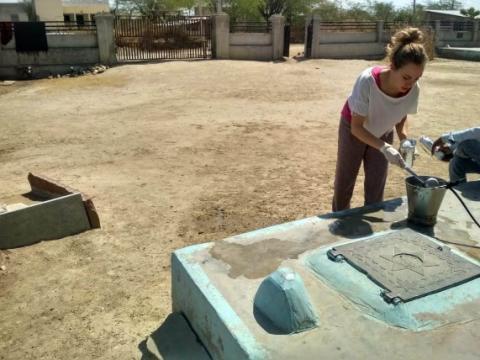
Being the Principal researcher of this project allowed me to develop advanced project management skills by taking control of deadlines and budgets, and social science skills by working on field and undertaking interviews with local people. Ethical issues must be carefully considered when working with people, and this was a new aspect of work for me, which is not commonly used by natural scientists and engineering academics. I could also experience a very different culture and faced difficulties mainly regarding language barriers. Working with NGOs Indian partners who speak not only Hindi but also the local language used by families and farmers made this work possible.
I also spent time working with academic partners at two different research institutions, IISER Bhopal and IIT Gandhinagar. I discovered the Panoply software and how climate data can be visually represented at global scale using this tool. I learnt how climate data are used to study past and future droughts and assist in characterising a region’s climate. From the water resources point of view, I had the opportunity to use for the first time Soil and Water Assessment Tool (SWAT) to model hydrological processes at watershed level. This was done considering digital elevation models (DEM), soil maps, land use and land cover (LULC) changes map, and forcing data (temperature and precipitation).
Networking and collaboration work is key for the success of most projects, especially when these are focused on a region we are not familiar with. In my case, being able to work with local Indian NGOs was the only way to be able to plan the field work, access the sites and carry out interviews to local people. Working with Indian academics provided me with new knowledge of modelling tools and gave me access to data that I would not have obtained from open sources.
Undertaking the Junior Research Scheme funded by IUKWC allowed me to spend 3 weeks in India during March 2019. During this time I experienced a broad range of situations as a junior scientist. I worked in remote rural areas in Rajasthan with the collaboration of Indian NGOs both during the field work and during the organisation and delivery of a workshop with locals and other NGOs.
"Paula Arce Vicente’s exchange project objectives were to analyse the quality of water stored in ponds and other infrastructure created by rural communities, the quality of groundwater which has been also been partially recharged through these structures, and the quality of water collected in the houses' tanks; to evaluate how much rain water harvesting is contributing to mitigate drought impacts by increasing fresh water availability; and to define water management guidelines for different uses (domestic use, irrigation) depending upon water quantity and quality. These guidelines may be linked to hydro-climate services information."